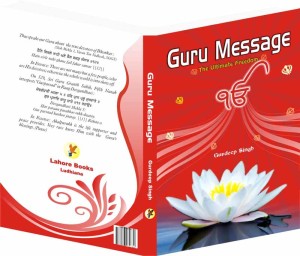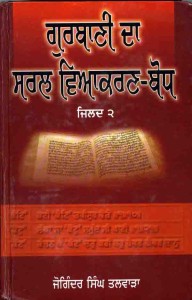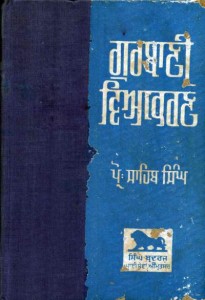On SGGS 1255-1256, there are First Guru Sahib’s detail about a way to be with Him. If we ponder over these verses, Har’s Sargun form is literally defined. No one can be a God individually, because it is Har’s divine Light that remains present in all. Those persons who envision Har’s divine Light become enlightened ones, and then no difference is remained between Har and them. The Guru calls this body Har’s abode; it is here where Har keeps His Jyot (light) present. As a person progresses spiritually through the Guru’s guidance, Har’s grace occurs and Har becomes manifested within. Let us look at those verses:
ਮਹਲਾ 1 ਮਲਾਰ ॥ ਪਰ ਦਾਰਾ ਪਰ ਧਨੁ ਪਰ ਲੋਭਾ ਹਉਮੈ ਬਿਖੈ ਬਿਕਾਰ ॥
ਦੁਸਟ ਭਾਉ ਤਜਿ ਨਿੰਦ ਪਰਾਈ ਕਾਮੁ ਕ੍ਰੋਧੁ ਚੰਡਾਰ ॥1॥
Mėhlā 1 malār. Par ḏārā par ḏẖan par lobẖā ha-umai bikẖai bikār.
Ḏusat bẖā-o ṯaj ninḏ parā-ī kām kroḏẖ cẖandār. ||1||
In essence: (to be worthy of Ekankar) A man who lives according to the Guru’s guidance gives up bad his intentions like taking interests in others wives, wealth, avarice, self-conceit, bad inclinations (vice), bad intentions, slandering of others, lust and anger.
Note: In the above verses, the essence of life is expressed of a Gurmukh, who doesn’t long for others ladies and wealth and who overcomes his/her greed, conceit and vice. The Gurmukh abandons slandering of others, lust and anger, because that is the Guru’s advice, and the Gurmukh takes it seriously. Interestingly, when mind falls in love with Ekankar, His name rules the mind; consequently, it (the mind) doesn’t embrace lust, greed, anger, and conceit. Please ponder over what the Guru says in the following verses in this context
ਮਹਲ ਮਹਿ ਬੈਠੇ ਅਗਮ ਅਪਾਰ ॥
ਭੀਤਰਿ ਅੰਮ੍ਰਿਤੁ ਸੋਈ ਜਨੁ ਪਾਵੈ ਜਿਸੁ ਗੁਰ ਕਾ ਸਬਦੁ ਰਤਨੁ ਆਚਾਰ ॥1॥ ਰਹਾਉ ॥
Mahal mėh baiṯẖe agam apār.
Bẖīṯar amriṯ so-ī jan pāvai jis gur kā sabaḏ raṯan ācẖār. ||1|| Rahā-o.
Within resides the inaccessible and infinite Creator. Only that person who is holding to the Guru’s shabad-jewel and lives according to it realizes the Creator’s nectarous presence within. Pause.
Note: As advised in above verses, one must get rid of one’s lust, greed, anger, and conceit. One must abandon bad intentions and these should be replaced with the Guru’s teachings. In other words, the Guru’s teachings should rule the mind instead. If it is done with sincerity, Ekankar, who is inaccessible and infinite, is envisioned within; otherwise, sticking to these things that create negativity leaves no chance of beholding Him within and out.
Page 1256
ਦੁਖ ਸੁਖ ਦੋਊ ਸਮ ਕਰਿ ਜਾਨੈ ਬੁਰਾ ਭਲਾ ਸੰਸਾਰ ॥
ਸੁਧਿ ਬੁਧਿ ਸੁਰਤਿ ਨਾਮਿ ਹਰਿ ਪਾਈਐ ਸਤਸੰਗਤਿ ਗੁਰ ਪਿਆਰ ॥2॥
Ḏukẖ sukẖ ḏo-ū sam kar jānai burā bẖalā sansār.
Suḏẖ buḏẖ suraṯ nām har pā-ī-ai saṯsangaṯ gur pi-ār. ||2||
When one gets imbued with Har’s name, one accepts all pains and comforts alike as Har’s given gifts and takes equally the good or bad behavior of the world (It is about accepting His Ordinance with no bickering). This wisdom comes through the Guru. His name is realized with His Grace and through the Guru’s love and the sants’ company.
Note: Please bear in mind that as long our conceit steers our actions, it is not possible to put the Guru’s advice in practice; therefore, getting rid of conceit is very important.
ਅਹਿਨਿਸਿ ਲਾਹਾ ਹਰਿ ਨਾਮੁ ਪਰਾਪਤਿ ਗੁਰੁ ਦਾਤਾ ਦੇਵਣਹਾਰੁ ॥
ਗੁਰਮੁਖਿ ਸਿਖ ਸੋਈ ਜਨੁ ਪਾਏ ਜਿਸ ਨੋ ਨਦਰਿ ਕਰੇ ਕਰਤਾਰੁ ॥3॥
Ahinis lāhā har nām parāpaṯ gur ḏāṯā ḏevaṇhār.
Gurmukẖ sikẖ so-ī jan pā-e jis no naḏar kare karṯār. ||3||
Those Guru’s followers to whom Har blesses take the Guru’s teachings seriously. The Guru gives “Har’s name” to them, because the Guru is capable of gifting it. After having His name gift, they remain imbued with His profitable name day and night.
Note: As we tread on the Guru’s path with utter sincerity, we live the Guru’s teachings with Har’s blessings, and we realize that only Har’s name is profitable in this life.
ਕਾਇਆ ਮਹਲੁ ਮੰਦਰੁ ਘਰੁ ਹਰਿ ਕਾ ਤਿਸੁ ਮਹਿ ਰਾਖੀ ਜੋਤਿ ਅਪਾਰ ॥
ਨਾਨਕ ਗੁਰਮੁਖਿ ਮਹਲਿ ਬੁਲਾਈਐ ਹਰਿ ਮੇਲੇ ਮੇਲਣਹਾਰ ॥4॥5॥
Kā-i-ā mahal manḏar gẖar har kā ṯis mėh rākẖī joṯ apār.
Nānak gurmukẖ mahal bulā-ī-ai har mele melaṇhār. ||4||5||
This body is Ekankar’s home; within it, Ekankar who is infinite, has installed His jyot (His Divine light/presence). Oh Nanak! Through the Guru’s guidance, the mind is stilled within. If the Creator, who is a real connector, wills so, He unites the mortals with Him.
Wishes
G. Singh
Bhagat Ravidas on 93, SGGS, says that there is no difference between Akalpurakh and His creation; through the enlightened ones, Akalpurakh imparts the knowledge about His being pervading all equally. Let us ponder over that shabda of his:
ਸਿਰੀਰਾਗੁ ॥ ਤੋਹੀ ਮੋਹੀ ਮੋਹੀ ਤੋਹੀ ਅੰਤਰੁ ਕੈਸਾ ॥ ਕਨਕ ਕਟਿਕ ਜਲ ਤਰੰਗ ਜੈਸਾ ॥1॥
Sirīrāg. Ŧohī mohī mohī ṯohī anṯar kaisā. Kanak katik jal ṯarang jaisā. ||1||
Raag Sree Raag, the bani of Bhagat Ravidas.
In essence: Oh Akalpurakh! What is the difference between you and me? It is like a golden bracelet and the gold, and the water and its ripples.
ਜਉ ਪੈ ਹਮ ਨ ਪਾਪ ਕਰੰਤਾ ਅਹੇ ਅਨੰਤਾ ॥ ਪਤਿਤ ਪਾਵਨ ਨਾਮੁ ਕੈਸੇ ਹੁੰਤਾ ॥1॥ ਰਹਾਉ ॥
Ja-o pai ham na pāp karanṯā ahe ananṯā. Paṯiṯ pāvan nām kaise hunṯā. ||1|| Rahā-o.
Oh infinite Akalpurakh! If we, mortals, do not commit sins, how your name will be known as the redeemer of the sinners? Pause.
ਤੁਮ੍ਹ੍ਹ ਜੁ ਨਾਇਕ ਆਛਹੁ ਅੰਤਰਜਾਮੀ ॥ ਪ੍ਰਭ ਤੇ ਜਨੁ ਜਾਨੀਜੈ ਜਨ ਤੇ ਸੁਆਮੀ ॥2॥
Ŧumĥ jo nā-ik ācẖẖahu anṯarjāmī. Parabẖ ṯe jan jānījai jan ṯe su-āmī. ||2||
Oh Knower of everyone’s heart! You are my guide; you are my Master. It is figured out from the master what kind of his servant is, and from the servant, the master is known.
ਸਰੀਰੁ ਆਰਾਧੈ ਮੋ ਕਉ ਬੀਚਾਰੁ ਦੇਹੂ ॥ ਰਵਿਦਾਸ ਸਮ ਦਲ ਸਮਝਾਵੈ ਕੋਊ ॥3॥
Sarīr ārāḏẖai mo ka-o bīcẖār ḏehū. Raviḏās sam ḏal samjẖāvai ko-ū. ||3||
Oh Akalpurakh! Bless me to meditate on you as long as this body is alive. Bless Ravidas with the company of those persons, who can explain that you pervade all equally.
Thus, understanding Him and creating an urge to be with Him is what Bhagat Ravidas advises us. And we must be beyond fear and animosity as He is because we want to be with Him.
Wishes
G Singh
www.gursoch.com
Very interestingly, Shri Guru Angad Sahib counsels his followers that there is no end of our urges and wishes. And, they do not let us have a peace of mind. In this game, once we get trapped, we keep seeking various pleasures and forget our Creator. This Slok is on SGGS 147; let us ponder over it:
ਮਃ ੨ ॥ ਆਖਣੁ ਆਖਿ ਨ ਰਜਿਆ ਸੁਨਣਿ ਨ ਰਜੇ ਕੰਨ ॥
ਅਖੀ ਦੇਖਿ ਨ ਰਜੀਆ ਗੁਣ ਗਾਹਕ ਇਕ ਵੰਨ ॥
ਭੁਖਿਆ ਭੁਖ ਨ ਉਤਰੈ ਗਲੀ ਭੁਖ ਨ ਜਾਇ ॥
ਨਾਨਕ ਭੁਖਾ ਤਾ ਰਜੈ ਜਾ ਗੁਣ ਕਹਿ ਗੁਣੀ ਸਮਾਇ ॥੨॥ {ਪੰਨਾ 147}
Mėhlā 2.
Ākẖaṇ ākẖ na raji-ā sunaṇ na raje kann.
Akẖī ḏekẖ na rajī-ā guṇ gāhak ik vann.
Bẖukẖi-ā bẖukẖ na uṯrai galī bẖukẖ na jā-e.
Nānak bẖukẖā ṯā rajai jā guṇ kahi guṇī samā-e. ||2||
The bani of Second Nanak.
In essence: The mouth remains insatiate with talking and the ears with hearing (different kind of stuff). The eyes remain insatiate with seeing. Every organ has its own different urge to have more and more. The hunger (all kinds of urges are defined above) doesn’t go away by merely talking. Oh Nanak! The hunger of desires (stated above) is satiated only if one utters Akalpurakh’s praises and gets drenched in His virtues.
Basically, the Guru advises us that since these desires with no end keep us away from our peace of mind-state, we should fall in love with our Creator and start praising Him in love to be in peace.
Wishes!
G.Singh
www.gursoch.com
On SGGS 1243, Shri Guru Angad Sahib explains how the philosophy of Shri Guru Nanak Sahib is better than those scriptures which take the believer into fruitless rituals while the mind remains engrossed in the Maya pursuits. Let us ponder over it:
ਸਲੋਕ ਮਃ 2 ॥ ਕਥਾ ਕਹਾਣੀ ਬੇਦਂੀ ਆਣੀ ਪਾਪੁ ਪੁੰਨੁ ਬੀਚਾਰੁ ॥ ਦੇ ਦੇ ਲੈਣਾ ਲੈ ਲੈ ਦੇਣਾ ਨਰਕਿ ਸੁਰਗਿ ਅਵਤਾਰ ॥
ਉਤਮ ਮਧਿਮ ਜਾਤੀਂ ਜਿਨਸੀ ਭਰਮਿ ਭਵੈ ਸੰਸਾਰੁ ॥ ਅੰਮ੍ਰਿਤ ਬਾਣੀ ਤਤੁ ਵਖਾਣੀ ਗਿਆਨ ਧਿਆਨ ਵਿਚਿ ਆਈ ॥
ਗੁਰਮੁਖਿ ਆਖੀ ਗੁਰਮੁਖਿ ਜਾਤੀ ਸੁਰਤਂੀ ਕਰਮਿ ਧਿਆਈ ॥ ਹੁਕਮੁ ਸਾਜਿ ਹੁਕਮੈ ਵਿਚਿ ਰਖੈ ਹੁਕਮੈ ਅੰਦਰਿ ਵੇਖੈ ॥
ਨਾਨਕ ਅਗਹੁ ਹਉਮੈ ਤੁਟੈ ਤਾਂ ਕੋ ਲਿਖੀਐ ਲੇਖੈ ॥1॥
Salok mėhlā 2. Kathā kahāṇī beḏīʼn āṇī pāp punn bīcẖār. Ḏe ḏe laiṇā lai lai ḏeṇā narak surag avṯār.
Uṯam maḏẖim jāṯīʼn jinsī bẖaram bẖavai sansār. Amriṯ baṇī ṯaṯ vakẖāṇī gi-ān ḏẖi-ān vicẖ ā-ī.
Gurmukẖ ākẖī gurmukẖ jāṯī surṯīʼn karam ḏẖi-ā-ī. Hukam sāj hukmai vicẖ rakẖai hukmai anḏar vekẖai.
Nānak agahu ha-umai ṯutai ṯāʼn ko likī-ai lekẖai. ||1|| {SGGS –1243}
Slok of Second Nanak.
In essence: The teachings of the Vedas reflect on what a sin is and what a virtue is. It is told in there that what one gives here takes in the next life; thus, they take birth to be in hell and heaven (This is the detailed Karma expressed in those scriptures.). The world wanders in the doubt of high and low caste. The Guru’s nectarous bani expresses all about the origin, Akalpurakh; it has come through the divine knowledge obtained through Akalpurakh’s meditation. The Guru has uttered it and realized it and the followers contemplate it with Akalpurakh’s grace. (This is what Sikhi is all about). As per His Will, Akalpurakh fashions the creation, keeps it under His Ordinance and takes care of it. Oh Nanak! First the conceit of the follower is eradicated and then he becomes acceptable to Akalpurakh.
Thus, in a nut shell, the Guru advises the followers to remain focus on improving themselves to be nice and worthy for the Creator. They need no ritual to please anyone but His meditation and praise.
Wishes
G Singh
On 138, SGGS, in a Waar “ Waar maajh ki”, penned by Shri Guru Nanak, the Second Guru, Shri Guru Angad Sahib addresses the behavior of those who live without keeping the Universal Creator in their hearts; however, he also states that actually they live as per His Will, thus, HE is everywhere; let us ponder over it:
ਵਾਰ ਮਾਝ ਕੀ ਤਥਾ ਸਲੋਕ ਮਹਲਾ 1
ਮਃ 2 ॥ ਦੇਂਦੇ ਥਾਵਹੁ ਦਿਤਾ ਚੰਗਾ ਮਨਮੁਖਿ ਐਸਾ ਜਾਣੀਐ ॥
ਸੁਰਤਿ ਮਤਿ ਚਤੁਰਾਈ ਤਾ ਕੀ ਕਿਆ ਕਰਿ ਆਖਿ ਵਖਾਣੀਐ ॥
ਅੰਤਰਿ ਬਹਿ ਕੈ ਕਰਮ ਕਮਾਵੈ ਸੋ ਚਹੁ ਕੁੰਡੀ ਜਾਣੀਐ ॥
ਜੋ ਧਰਮੁ ਕਮਾਵੈ ਤਿਸੁ ਧਰਮ ਨਾਉ ਹੋਵੈ ਪਾਪਿ ਕਮਾਣੈ ਪਾਪੀ ਜਾਣੀਐ ॥
ਤੂੰ ਆਪੇ ਖੇਲ ਕਰਹਿ ਸਭਿ ਕਰਤੇ ਕਿਆ ਦੂਜਾ ਆਖਿ ਵਖਾਣੀਐ ॥
ਜਿਚਰੁ ਤੇਰੀ ਜੋਤਿ ਤਿਚਰੁ ਜੋਤੀ ਵਿਚਿ ਤੂੰ ਬੋਲਹਿ ਵਿਣੁ ਜੋਤੀ ਕੋਈ ਕਿਛੁ ਕਰਿਹੁ ਦਿਖਾ ਸਿਆਣੀਐ ॥
ਨਾਨਕ ਗੁਰਮੁਖਿ ਨਦਰੀ ਆਇਆ ਹਰਿ ਇਕੋ ਸੁਘੜੁ ਸੁਜਾਣੀਐ ॥2॥
Mėhlā 2. Ḏeʼnḏe thāvhu ḏiṯā cẖanga manmukẖ aisā jāṇī-ai.
Suraṯ maṯ cẖaṯurā-ī ṯā kī ki-ā kar ākẖ vakẖāṇī-ai.
Anṯar bahi kai karam kamāvai so cẖahu kundī jāṇī-ai.
Jo ḏẖaram kamāvai ṯis ḏẖaram nā-o hovai pāp kamāṇai pāpī jāṇī-ai.
Ŧūʼn āpe kẖel karahi sabẖ karṯe ki-ā ḏūjā ākẖ vakẖāṇī-ai.
Jicẖar ṯerī joṯ ṯicẖar joṯī vicẖ ṯūʼn bolėh viṇ joṯī ko-ī kicẖẖ karihu ḏikẖā si-āṇī-ai.
Nānak gurmukẖ naḏrī ā-i-ā har iko sugẖaṛ sujāṇī-ai. ||2|| {SGGS – 138}
The bani of Second Nanak.
In essence: The mind-slave prefers Ekankar’s given gifts to Ekankar, who actually gives those gifts to him. It is hard to explain what common sense, wisdom, and cleverness he (the mind-slave) has. Though he acts secretly, his actions become well known. One, who acts virtuously, is known as virtuous and that one, who commits sins, is known as sinner. Oh Har! This is your own play, because they act as you cause them to act. What else we should say? As long as your jyot (light) is present in the mortals, they (actually you) speak; without your jyot, who can speak (none)? Oh Nanak! One can see the all wise and omnipotent Creator everywhere through the Guru.
Wishes!
G Singh
www.gursoch.com










